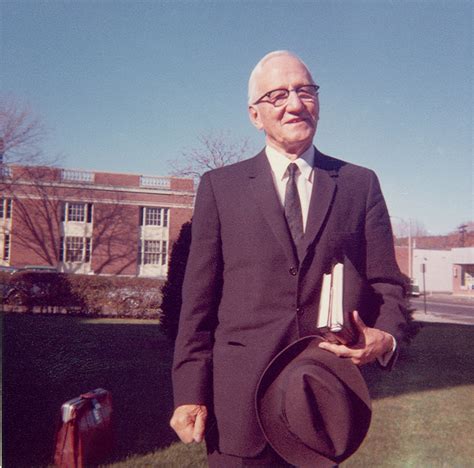A Quote by Stanislaw Lem
The fate of a single man can be rich with significance, that of a few hundred less so, but the history of thousands and millions of men does not mean anything at all, in any adequate sense of the word.
Related Quotes
Technologically, modern man does everything he can do-he functions on this single boundary principle. Modern man, seeing himself as autonomous, with no personal-infinite God who has spoken, has no adequate universal to supply an adequate second boundary condition; and man being fallen is not only finite, but sinful. Thus man's pragmatically made choices have no reference point beyond human egotism. It is dog eat dog, man eat man, man eat nature.
A knowledge of history as detailed as possible is essential if we are to comprehend the present and be prepared for the future. Fate...is not the blind superstition or helplessness that waits stupidly for what may happen. Fate is unalterable only in the sense that given a cause, a certain result must follow, but no cause is inevitable in itself, and man can shape his world if he does not resign himself to ignorance.
If one person sits down at their computer one day and types one word, dose that affect the future? If that one person didn't type that one word, would the future's history be changed? Dose their one word even mean anything? Dose my one (times a lot) word mean anything? Dose that one person's one word even get read-once? If I wasn't sitting here writing my words, would my future be different?
A man is not merely a man but a man among men, in a world of men. Being good at being a man has more to do with a man’s ability to succeed with men and within groups of men than it does with a man’s relationship to any woman or any group of women. When someone tells a man to be a man, they are telling him to be more like other men, more like the majority of men, and ideally more like the men who other men hold in high regard.
History does nothing, possesses no enormous wealth, fights no battles. It is rather man, the real, living man, who does everything, possesses, fights. It is not History, as if she were a person apart, who uses men as a means to work out her purposes, but history itself is nothing but the activity of men pursuing their purposes.
No single man makes history. History cannot be seen, just as one cannot see grass growing. Wars and revolutions, kings and Robespierres, are history's organic agents, its yeast. But revolutions are made by fanatical men of action with one-track mind, geniuses in their ability to confine themselves to a limited field. They overturn the old order in a few hours or days, the whole upheaval takes a few weeks or at most years, but the fanatical spirit that inspired the upheavals is worshiped for decades thereafter, for centuries.
It is not surprising that only one medieval state, Venice, long possessed anything clearly identifiavble as a navy in this sense. We shall see that no state in the British Isles attained attained this level of sophistication before the 16th century, and no history of the Royal Navy, in any exact sense of the words, could legitimately begin much before then. This book, which does, is not an institutional history of the Royal Navy, but a history of naval warfare as an aspect of national history. All and any methods of fighting at sea, or using the sea for warlike purposes, are its concern.





































